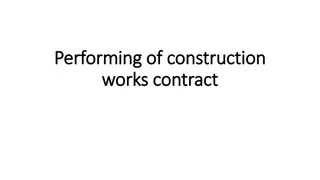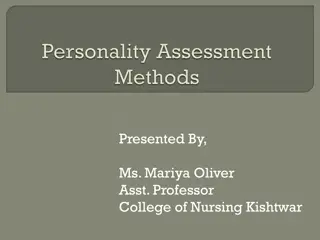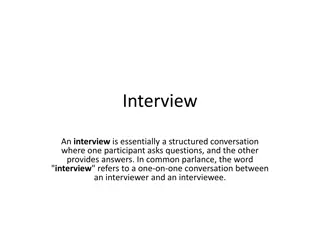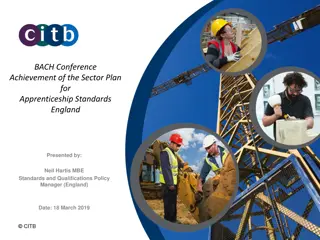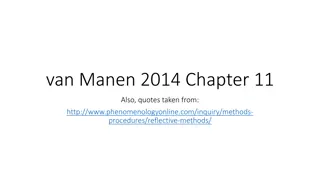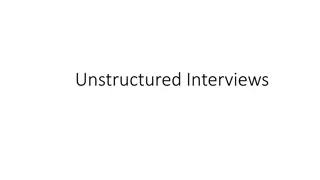Understanding Interviews: Construction, Types, and Methodologies
Interviews are essential for collecting data in exploratory research. This content elaborates on the construction, types, and methodologies of interviews, including unstructured and structured approaches. Tips for minimizing bias, training interviewers, and the benefits of face-to-face interviews are also covered.
Download Presentation

Please find below an Image/Link to download the presentation.
The content on the website is provided AS IS for your information and personal use only. It may not be sold, licensed, or shared on other websites without obtaining consent from the author. Download presentation by click this link. If you encounter any issues during the download, it is possible that the publisher has removed the file from their server.
E N D
Presentation Transcript
Construction and Validation of an Interview Schedule Dr. Sampark Acharya Asst. Professor Rajasthan Shiksha Mahavidyalaya Jaipur
What is Interviewing? One of the method to collect data Used specially for exploratory researches Identification of newer facts / factors and deeper understanding Chances of bias (Interviews by more than one interviewer) To minimize bias- Proper training to interviewer Checking their interpretations Voice inflections Avoid differences in wordings
Types of Interview- On the Basis of Structure- On the Basis of Place/position- Unstructured Interview Structured Interview Semi Structured Interview Face to Face Interview Telephonic Interview On the Basis of number of respondents- Individual interview Focus group interviews On the Basis of using technology- Computer Assisted Interviews Computer Aided Survey Interviews
Unstructured Interviews- To explore and probe into several factors in the situation that might be central to the broad problem area. It is the basis for conducting structured interviews More suitable for face-to-face interview Helps in understanding- Whether the problem in hand is symptom of a more and serious deep routed problem Identification of several critical factors in the situation
Unstructured Interview Methodology- Problem Statement Brainstorming Idea Building Subject Research Completion
Structured Interview- Conducted after understanding outset of what information is needed List of predetermined questions is already prepared by the interviewer Can be conducted through face-to-face / telephonically / medium of PC Interviewer must be familiar with the purpose of each and every question
Face-to-face Interviews- Mostly constructed for unstructured interviews Interviewer can adapt the questions that are necessary and ensure that there is a clarity in responses. Non-verbal cues can also be an added advantage that cannot be picked up through telephonic interviews Geographical survey. Cost optimization Respondents feel insecure about their anonymity when face-to-face. limitations of the
Telephonic Interviews- Can reach out of the geographicallimitations. Respondents eliminate discomfort. Respondents terminate the interview by hanging up warning. Fixing mutually convenient time. Cannot read communication could without any can non-verbal
Computer Assisted Interviews- Questions flashed on the screen. Respondents can enter answer into the computer. Out-of-range responses eliminated. Right sequencing order. Improved accuracy. Quick, accurate and faster always of data Low field cost Can be taken in two ways- Computer Assisted Telephone Interviews (CATI) Computer Assisted Personal Interviews (CAPI)
CATI & CAPI- CATI CAPI PC is networked into the telephonic System Respondents can use their own computers to respond. Computer select numbers, dials and stores the responses iat specific file/folder. REspondents receive software and respond.
Computer Aided Survey Interviews- It can be analyzed when field surveys are in progress. Data can be cleaned up and errors can be fixed. Bias can be eliminated. Skip pattern can be programmed. Questions can be customised according to the respondent.
Individual Interviews- One interviewee at one time. More specific as the interviewer focuses on the responses of one individual
Focus Group Interviews- Applied on more than one respondent at once. Applied if the information is to be gathered from more respondents. Useful when time and resources are limited. The group is called focus group Each and every group member has an stakon the issue.
Characteristics of a focus group- Nature and number of the individuals constituting the focus group Comfortable environment Sampling and number of focus group Framing questions Training for the interviewer for holding focus group interviews
Nature and number of respondents constituting the focus group Include those individuals in the group who have the characteristics, experience,or knowledge needed to provide rich information on the topic. Limit the size of the group to 6-8 individuals so that almost all the participants have a chance to share the information or ideas. All participants in the group should feel comfortable while taking with one- another.
Comfortable environment Hold focus group interaction in familiar or neutral settings. Proper seating arrangements Askquestions in their language
Sampling and number of focus group- Use purposive sampling for constituting focus group Frame three or four focus groups for each audience category that is interested. If after third or fourth group/round, the team is still receiving new information, the team might continue conducting focus groups untilno new information is elicited.
Framing Questions- 1. The questions must be conversational and easy for the participants 2. The questions should focused on getting information that directly relates to the objectives of the study. 3. Use questions that get participants involved. 4. Use open-ended questions 5. Avoid yes / no type questions. 6. Avoid why question if possible. 7. Use think back questions 8. The questions must be conversational and easy for the participants 9. The questions should focused on getting information that directly relates to the objectives of the study. 10. Use questions that get participants involved.
Training for the interviewer- Interviewer should be trained in a manner that he can- Make sure that every participant speaks the same amount in the group. Control dominant talker by thanking them for their inputs and asking for others to share. Remind the group that it is important to hear from everyone. Call on quite participants. They are often reflective thinkers and have creative things to offer. Create a thoughtful, receptive atmosphere, provide ground rules, and set the tone of the discussion in an open environment. Use field notes, tape recordings, cameras, laptops etc for recording the discussion.
Questioning Technique- Funneling Unbiased Questions Clarifying Issues Taking notes.
Funneling- Open ended questions to get a broader idea about the problem Ask more focused Questions BROAD to NARROW
Unbiased Questions- Askquestions which give least biases in response. A loaded question influences the answers received from the respondent. Bias could be introduced by emphasising certain words, by tone and inflections and through improper suggestions.
Clarifying Issues- Interviewer should rephrase or restate important information given by the respondent. Make sure that the interviewer understands issues as the respondent intends to represent them. Interviewer should help the respondent to think through issues by asking questions in a simple way if he/she is finding it difficult to understand.
Taking Notes- The interviewer must take written notes The information recalled from memory isimprecised or often incorrect. If more than one interview is scheduled, the information received increases. The interview can be recorded on tape/disks/electronic gadgets if the respondent has no objection.
Ethics of Interviewing- 1. The subject/interviewee is free to respond the questions either short, brief or in detail. 2. The interviewer must not use words which may hurt the interviewee. 3. The interviewer should listen the responses carefully and write all useful information immediately. 4. The interviewer may summarize the responses as per the requirement but the final response draft should be verified by the interviewee. 5. Responses may be classified as per the need. 6. The final summary of the interview must be shown to the interviewee and if the interviewee suggests/wants any corrections; the interviewer must do the same.
When we need to take interview in research? 1. After quantitative studies. 2. To find more information, cause and effect relation.
Interviewing technique- Preparation for the interview Conducting the interview Recording the interview
Preparation for the interview- The interviewer must decide exactly what kind of information the interview should yield. Whether structured / unstructured or semistructured procedure willbe more useful. How the results ofthe interview willbe recorded. The interviewer must have a clear idea of the sort of information he needs, and accordingly should prepare the interview schedule with list of questions which willextract the information. It is advisable to tryout the interview on another person before using it for actual investigation. This may revealthedeficiencies that should be correctedbeforethe actualexecution ofthe interview.
Conducting the interview Ask only one question at a time Repeat a question if necessary Try to make sure that the subject understands the questions. Listen carefully for the interviewee s answers Observe the subjects facial expressions Allow sufficient time Avoid suggesting answers Do not sign of surprise, shock, anger etc. Maintain neutral attitude Use tactics and skills
Recording an interview- Schedule Structured format Rating scale Tape recorder Cameras
Reliability and validity of an interview schedule- The reliability of data obtained through interview schedule is affected by the following factors- The desire of many interviewees to make good impression, particularly in answers to questions relating to generally accepted standard behavior. The reluctance of many subjects to revealhighly personal information. Content and form of questions For validity it is advisable to obtain face validity or compare the interviewees responses with another sources of data.
Administration of Interview Schedule The interviewer should take the permission for the interview from the interviewee for the administration. On scheduled dates, the interviewer himself/herself should appeared at the premises/office/scheduled place on the scheduled time and made the further proceedings.
Construction of an Interview Schedule 1. Collection of Items 2. Language Expertise 3. Field Expertise 4. Research Expertise/Face Validity
Analysis of Our Quantitative Analysis (Sample) H01: There would be no significant differences between stress levels of boy and girl hostellers. H1: There would be a significant difference difference between stress levels of boy and girl hostellers. Table:1 Significance of difference between stress levels of boy and girl hostellers Factors N DF Mean SD T Value P Value (alpha=0 .05) Boys Girls Boys Girls Boys Girls Personal Factors 236 227 461 20.52 19.00 5.96 6.90 2.53 0.01 Facilities 236 110 344 42.93 47.05 14.52 11.64 3.39 0.00
Major factors of stress among boys and girls Factor Boys Girls P Value Personal Factors 20.52 19.00 0.0118 Facilities 42.93 47.05 0.0008
Major factors of stress among boys and girls 1. Boys are significantly more stressed than girls in terms of personal factors. 2. Girls are more significantly stressed than boys in terms of facilities.
Findings of Our Quantitative Study 1. A significant difference was found between stress levels of boy and girl hostellers with regards to their personalfactors. 2. A significant difference was found between stress levels of boy and girl hostellers concerning facilities available in hostel.
Reasons behind Hypothesis Rejection I. 1. Boys were found to be more stressed than girls as they could not meet their ill family members. Personal Factors- II. Facilities- 1. Girls were more stressed than boys because the temperature of the place where they were living was extreme. 2. Girls were more stressed because the design of their rooms was made closed type than of boys. The design of boys room was made open type with windows. 3. Boys were more stressed than girls as they could not consult their problems with teachers and/or warden.
Reasons behind Hypothesis Rejection III. Family Factors- 1. Boys were found more stressed than girls as parent s expectations about their studies were high. 2. Boys were found more stressed than girls as parent s take regular follow up and frequent calls about studies.
What Questions to be added in Interview Schedule? I. 1. In our research, the hosteller boys were found significantly more stressed than girls as they could not meet their ill family members. Can you please tell me the reason behind this that why girls do not take stress about their illfamily members and boys do? 2. II. Facilities- 3. Boys and girls have been provided same facilities in the hostel, but girls complain more significantly than boys about the extreme temperature. Can you please explain what could be the reasons behind this attitude? 4. It was found that the rooms designed for girls are very closed type. How the design of the room can make the girls stressed. 5. In hostel, boys were found to be facing difficulties in sharing their thoughts or consults with teacher or warden,why the boys have to face this situation? Personal Factors-
Interview Schedule The interview schedule should be divided in two sections. Section-I consists of the opening statements; in which the motto of the interview is described. Section-II is main part of the interview schedule which is divided in 2 parts i.e. Body and Closing. The Body of the interview should have at least three parts. In first part of the body; question related to general demographic information are included. In second and third part of the Body; questions related to hostellers stress, and provisions and strategies of removing/coping stress will be asked. The Closing part of the interview consist the gestures and questions in relation to further information if left any.
Interview Schedule Prof. XYZ Ms. RSTUl Dean Research Scholar NOPQ Department (Interviewer) ABCD University, Jaipur Name of Interviewee:---------------------------------------------------------------Post: ------------------------------------------ Name and Address of Office:------------------------------------------------------------------------------------------------------- Date of fixing Appointment:-------------------------------- Time fixed for Interview:---------------------------------------- Date of Interview:--------------------------------------------- Time of Interview:-----------------------------------------
Section-I I. Opening A. (Establish Rapport) [Gestures] My name is RSTUI and I am a research scholar of NOPQpartment, ABCD University, Jaipur. I have taken an appointment from you regarding interview for my research project. The topic of my research is Determining Factors of Stress among Hostellers of NOPQ University B. (Purpose) I would like to ask you some questions about your professional background, your portfolio and job profile, some experiences you have had, and some of the your perception about stress factors of hostellers. C. (Motivation) I hope this valuable information will help me in my research project very much. D. (Timeline) The interview should take about 25-30 minutes. Are you available to respond to some questions at this time? (Transition: Let me begin by asking you some questions about your professional background, your portfolio/job profile, your experience and some your perception about stress factors of hostellers)
Section-II II. B. Factors of Stress among Hostellers- a) Personal Factors- 1. In our research, the hosteller boys were found significantly more stressed than girls as they could not meet their ill family members. Can you please tell me the reason behind this that why girls do not take stress about their illfamily members and boys do? b) Facilities- 1. Boys and girls have been provided same facilities in the hostel, but girls complain more significantly than boys about the extreme temperature. Can you please explain what could be the reasons behind this attitude? 2. It was found that the rooms designed for girls are very closed type. How the design of the room can make the girls stressed. 3. In hostel, boys were found to be facing difficulties in sharing their thoughts or consults with teacher or warden,why the boys have to face this situation?
c) Family Factors- 5. In study, Boys were found more stressed than girls as parent s expectations about their studies were high. Why parents keep more expectations from boys but not from girls? 6. Boys were found more stressed than girls as parent s take regular follow up and frequent calls about studies. Why boys do not like their parentalfollow ups but girls do not bother?
Closing 1. As per your opinion, the boys are more stressed than girls in terms of meeting with their ill family members because of the following reasons- ------------------------------------------------------------------------------------------------------------- 1. As per your opinion girls are more stressed than boys in terms of temperature situations because of the followingreasons- ------------------------------------------------------------------------------------------------------------ 1. As per your opinion, the design of the room make girls more stressed in comparison of the boys because of the following reasons- -------------------------------------------------------------------------------------------------------------- 1. As per your opinion, the boys face more difficulties for sharing their thoughts/problems with teachers/warden because of the following reasons- --------------------------------------------------------------------------------------------------------------
5. As per your opinion, the boys are more stressed than girls in terms of parental expectations because of the following reasons- -------------------------------------------------------------------------- 6. As per your opinion, the boys are more stressed than girls in terms of parental follow ups because of the following reasons- --------------------------------------------------------------------------------
(Maintain Rapport) I appreciate the time you took for this interview. Is there anything else you think would be helpful for me to know so that I can successfully introduce it in my research report? (Action to be taken) I should have all the information I need. Would it be alright to call you at home if I have any more questions? Thanks again. I look forward to get further help/information from you regarding my research project.
Validation Language Expertise Field Expertise Research Expertise/Face Validity





